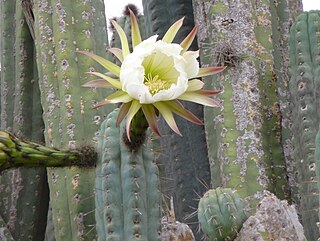
Echinopsis lageniformis, synonyms including Echinopsis scopulicola and Trichocereus bridgesii, is a cactus native to Bolivia. It is known as the Bolivian torch cactus. Among the indigenous populations of Bolivia, it is sometimes called achuma or wachuma, although these names are also applied to related species such as Trichocereus macrogonus which are also used for their psychedelic effects.

Trichocereus macrogonus, synonym Echinopsis macrogonus, is a species of cactus found in Ecuador, Peru and Bolivia. Two varieties are accepted as of September 2023: var. macrogonus and var. pachanoi. Plants contain varying amounts of the psychoactive alkaloid mescaline. They have been used both ritually and in traditional medicine from pre-Columbian times. Trichocereus macrogonus is one of a number of similar species that may be called San Pedro cactus. Indigenous names include achuma and huachuma, although these too may be applied to similar species.

Soehrensia candicans is a species of cactus from northern and western Argentina. It has large fragrant white flowers that open at night.

Leucostele terscheckii, commonly known as the cardon grande cactus or Argentine saguaro, is a large cactus native to South America and popular in cultivation.

Soehrensia angelesiae is a species of cactus.

Weberbauerocereus weberbaueri is a species of Weberbauerocereus from Peru.

Oreocereus trollii, commonly known as the Old Man of the Andes cactus, is a species of cacti native to Argentina and Bolivia. Though listed as Least Concern by the IUCN, the plant is collected extensively, and in some areas is threatened.

Soehrensia formosa, is a species of Echinopsis found in South America. In north-western Argentina, Bolivia and northern Chile. First published in Cactac.: Handb. Kakteenk. 3: 1678 in 1959.

Echinopsis densispina, is a species of Echinopsis found in Argentina.

Echinopsis aurea, is a species of Echinopsis found in Argentina.
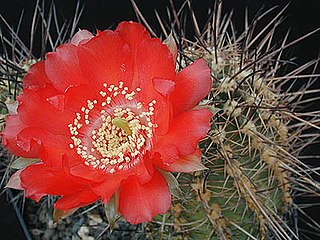
Echinopsis haematantha, is a species of Echinopsis found in Argentina and Bolivia.

Soehrensia huascha, is a species of Soehrensia in the Cactaceae family, found in north western Argentina. First published in Cactaceae Syst. Init. 29: 5 in 2013.
Echinopsis chalaensis, is a species of Echinopsis found in Peru.

Echinopsis strigosa, is a species of Soehrensia in the cactus family. It is native to north western Argentina. It was first published in Cactaceae Syst. Init. 28: 31 in 2012.
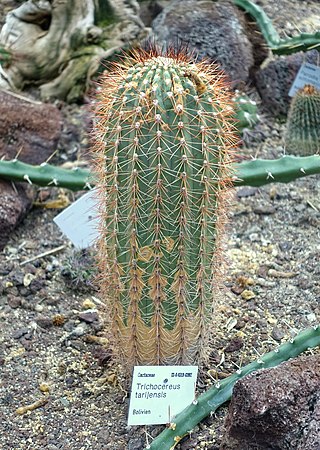
Soehrensia tarijensis, is a species of Soehrensia, in the cactus family. It is native to Bolivia and northwestern Argentina.
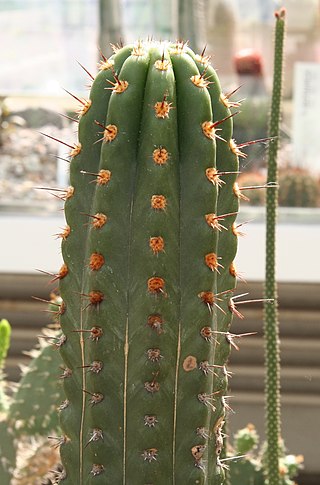
Echinopsis clavata, is a species of Echinopsis found in Bolivia.
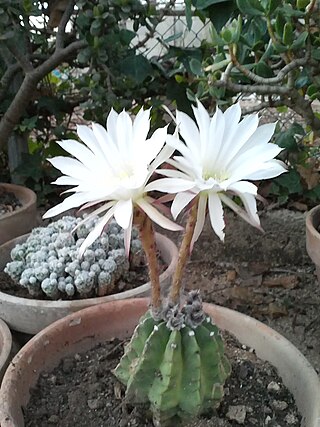
Echinopsis calochlora, is a species of Echinopsis found in Bolivia.

Haageocereus decumbens is a species of Haageocereus found in S. Peru to Chile (Tarapacá)

Cleistocactus baumannii is a species of Cleistocactus found in Argentina, Paraguay, Bolivia, Uruguay, and Brazil.

Leucostele litoralis is a species of Leucostele found in Chile.




















